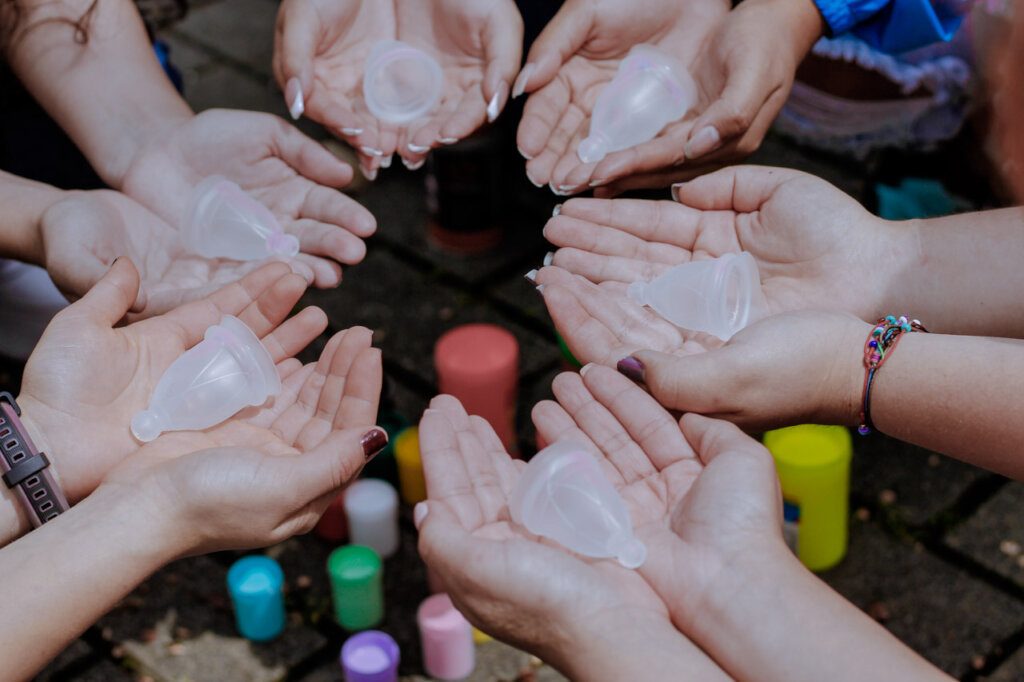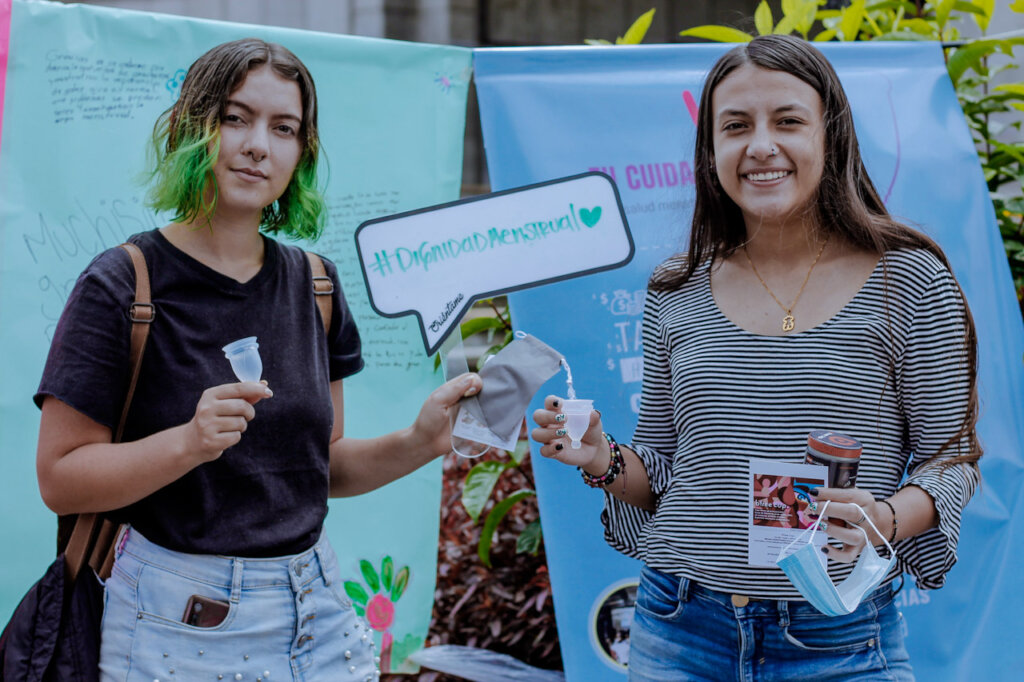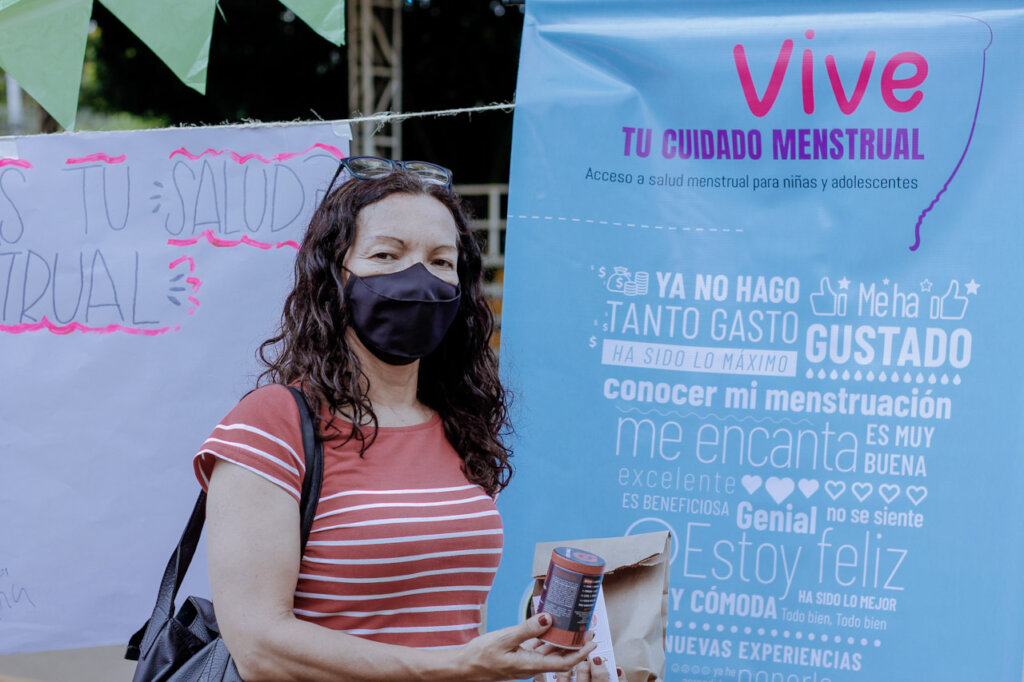By Maria Vivas | Live your menstrual care
NARRATIVE REPORT FORMAT
1. GENERAL INFORMATION:
2. PROJECT OBJECTIVES:
3. ACTIVITIES EXECUTED:
During the period from September 08 to December 06, 2021, the planning process of the project activities was outlined, and the implementation of the activities was initiated:
3.1 Develop educational content and didactic exercises for training sessions on menstrual care and self-care.
The design of the virtual course on menstrual health was carried out; the contents were developed through four recorded and animated units: "knowing my body"; "my menstrual cycle, my rules"; "menstrual care"; and "the menstrual cup as a great option."
3.2 Inviting girls and adolescents to formative activities on menstrual care and health, body self-knowledge.
It had two components:
The invitation to launch the project was spread among different stakeholders, such as community leaders, institutional referents, and teachers, to make the course available to them and promote it among girls.
We also directly invited girls and young women between 13 and 25 years old in Pereira and Dosquebradas and community leaders. Furthermore, the invitation was shared through different virtual media such as social networks, email, WhatsApp, and phone calls.
Three WhatsApp groups were created to share information and reminders of important dates with the participants, as well as the tutorial calendar and any news related to the virtual course. The content was developed according to their age for three groups: the first was adolescents between 13 and 14 years old; the second group was adolescents between 15 and 17 years old, and the third was made up of women 18 years old and older.
A total of 665 girls, adolescents, young people, and leaders enrolled in the project from different locations in Pereira and Dosquebradas, conducted virtually this time. This course strengthened the knowledge and autonomy in the care of the body of 161 young people between the ages of 13 and 25. At the same time, 28 leaders, professionals, and mothers registered to participate in the training cycle on menstrual health.
3.3 Conduct virtual training in menstrual care and health, focusing on girls' self-awareness of their bodies.
The virtual course began on September 27 to October 29, 2021. Each unit contained the following activities:
3.4 Prepare the general concept for the campaign and graphic pieces on menstrual cup use and menstrual hygiene.
Seventeen graphic pieces were designed within the framework of the virtual course, emphasizing key aspects of the use of the menstrual cup, the concept of menstrual health, the menstrual cycle, menstrual products, and knowledge of our body.
3.5 Raising awareness.
Informative capsules on menstruation were published on social networks and WhatsApp groups. Messages from participants expressing their appreciation for the course were also posted, as well as they shared a drawing of their vulva. We compiled some images, highlighting their creations and their messages to their vulva.
3.6 Identify the leaders of the participating municipalities.
3.7 Develop a work plan with the leaders.
3.8 Implement virtual chats on menstrual health, use, and maintenance of the menstrual cup, myths about menstruation, and the menstrual cup.
The four sessions developed within the training cycle included the correct use of the cup, good and bad practices in using the cup, myths and advantages of menstruation, body knowledge, different definitions, and menstruation practices in different contexts.
3.9 Purchase of menstrual cups.
With the support of FOKUS and Women's Global Health Innovations, it was possible to purchase and deliver menstrual cups in two different sizes, of excellent quality, and at affordable prices.
4.0 Provide menstrual cups to girls and adolescents.
We mapped the municipalities of Pereira and Dosquebradas to identify strategic delivery points that were close to the largest possible number of participants. As a result, four community leaders delivered menstrual cups on November 20, 2021, at Olaya Herrera Park (Pereira) and Vahler Park (Dosquebradas).
Results:
4.1 Virtual course on menstrual health and care delivered to girls and adolescents
4.2 Menstrual hygiene awareness campaign aimed at girls and adolescents.
4.3. Menstrual cups given to adolescents for menstrual care.
5. EVALUATION OF PROJECT PROGRESS:
5.1 Main achievements
The end of school represented certain difficulties for some girls and adolescents since their dedication focused on finishing their studies and completing assignments and evaluations. For this reason, they started the virtual menstrual health course but did not finish it due to time constraints.
Difficulty with internet connection was a significant obstacle for some young women to complete the virtual course and connect to the tutorials. However, in the face of this obstacle, the tutorials were recorded, sent via email, and uploaded to the course platform so they could see them, and it was reported as attendance.
In times of the COVID-19 pandemic, in this third phase, it was a challenge to carry out the menstrual health course in person since the institutions that were contacted did not provide the spaces and the caretakers of the girls, who did not have internet or mobile devices, were worried about the idea of meeting. However, this allowed the girls to have their parents' permission to participate from their phones or computers and thus complete the training process.
We have to consider the barriers of connectivity and access to mobile devices for a project like this. Furthermore, the attendance of the participants in the course and the tutorials is something over which we have little to no control. This leads us to consider an additional effort to achieve the participation and coverage goals.
We have learned that menstrual health management should continue to be addressed broadly to provide safe and accurate information about menstruation, the advantages and disadvantages of various menstrual products, and the promotion of knowledge and care of one's own body. From this knowledge, we are aware of the power we have to make decisions, participate in safe sex and understand natural processes such as menstruation.
6.Annexes:
View the capsules: https://fundaorientame-my.sharepoint.com/:f:/g/personal/aguatava_orientame_org_co/EhwgvOfOS-1OqNqUxhCrz48BGWrVLrlEbz9dhtXX_6gZ5g?e=6QkcDj
View the list of young women enrolled: https://fundaorientame-my.sharepoint.com/:x:/g/personal/aguatava_orientame_org_co/EVxmDHiZkjpPn1stz0Mio7MBfTHJXyfhgHlHCQYPfD0i_g?e=e8Vtt7
View the list of enrolled leaders: https://fundaorientame-my.sharepoint.com/:x:/g/personal/aguatava_orientame_org_co/EcCpKX8eiAhNsB1uXto3-IgB2cVCl3L1TRvnBIymXIlpfA?e=q7V0dJ
View the course results: https://fundaorientame-my.sharepoint.com/:x:/g/personal/aguatava_orientame_org_co/EU6NTmb4dKJKqc3GxpA8EOkBQGw6nhsB1TP7K1dPzleFdA?e=JakTD0
View photos of the menstrual cup delivery: https://fundaorientame-my.sharepoint.com/:f:/g/personal/aguatava_orientame_org_co/EtvBpyN16qhKtdAYZKB-XxIB6cgtCRzOMdKMSZZ-h4y_4A?e=1qxRxs
Links:
Project reports on GlobalGiving are posted directly to globalgiving.org by Project Leaders as they are completed, generally every 3-4 months. To protect the integrity of these documents, GlobalGiving does not alter them; therefore you may find some language or formatting issues.
If you donate to this project or have donated to this project, you can receive an email when this project posts a report. You can also subscribe for reports without donating.
Support this important cause by creating a personalized fundraising page.
Start a Fundraiser

